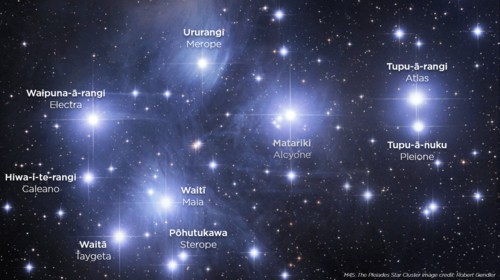Unveiling the Stars: Matariki Meaning for Families
Hello, bright and curious parents! Are you ready to embark on a celestial journey with your little ones and learn all about Matariki, the sparkling eyes of the year? Matariki, known as the M?ori New Year, is a special time in New Zealand (Aotearoa) that offers a wonderful opportunity for family bonding and cultural enlightenment. In this comprehensive guide, we’re going to uncover the layers of meaning behind Matariki and how you can share its significance with your children.
What is Matariki?
First things first! Matariki is a time-honored celebration that marks the rising of the Matariki star cluster, also known internationally as the Pleiades or the Seven Sisters. For the M?ori, the indigenous people of New Zealand, it signals the start of the New Year and is often greeted with joy, reflection, and festivities. The appearance of Matariki in the winter sky brings forth a period of remembrance, planting new crops, and celebrating new life.
The Matariki Star Cluster
The Matariki star cluster is not just a random group of stars. Each star holds a particular significance and is believed to watch over different realms of the environment. From the oceans to the winds, each star brings a unique message and blessing for the coming year. Let’s illuminate the path for our youngsters and dive into the stories and teachings of these celestial guides!
The Cultural Significance of Matariki
The resurgence of Matariki celebrations in contemporary times has helped in preserving M?ori culture and heritage. By engaging in Matariki festivities, you and your children can hold hands with the past, honoring the traditions and practices of those who navigated by the stars.
Matariki Traditions and Practices
Each community and iwi (tribe) may have their own unique ways of celebrating Matariki, but common customs include the sharing of food, song, dance, and storytelling. Kite flying is another popular activity, symbolizing the connection between the heavens and Earth. As the kites dance in the sky, they send our wishes and dreams aloft to the stars.
Sharing Matariki with Your Children
Instilling cultural knowledge and respect in your children is a precious gift. By learning about Matariki and its traditions, your little ones can develop a deeper understanding of the world and the people around them. In the next sections, we’ll guide you through fun activities, stories, and crafts that you can share with your family to bring the spirit of Matariki alive in your home.
Matariki Activities for Families
One of the fondest ways to engage with Matariki is through activities that enable both learning and bonding. Whether you’re crafting star ornaments, preparing traditional M?ori foods, or stargazing, these activities bring the essence of Matariki into your family’s everyday life.
From the kitchen to the craft table, to the great outdoors, there are myriad ways to immerse yourselves in the Matariki spirit. Continue reading for a trove of ideas on how to respectfully partake in Matariki celebrations with joy and enthusiasm right alongside your children.
Now, let’s dive into some heartwarming ways to celebrate Matariki right at the comfy confines of your own home. You don’t need to venture far to connect with the stars! Stay tuned, as this guide leads you through the starry path of understanding the Matariki meaning and making the most out of this astronomical occasion with your family.
Remember, while Matariki is a specific cultural observance tied to the M?ori people of New Zealand, learning about and participating in its traditions can instill universal values of unity, remembrance, and gratitude in your children. Let’s navigate the nightscape of knowledge together and discover the warmth and wisdom wrapped within the Matariki stars.

5 Essential Things Parents Should Know in Preparing for Matariki
1. Understanding the Timing of Matariki
The Matariki star cluster rises in the pre-dawn sky once a year, marking the M?ori New Year, and its appearance can vary depending on the lunar calendar. It’s crucial for families to know the timing of this event. Traditionally, Matariki is observed with the new moon following the first sighting of the star cluster. Make sure to check local calendars and resources so your family can begin celebrating at the appropriate time.
2. Preparing for Matariki-Themed Activities
At the heart of Matariki celebrations are activities that bring people closer to nature, culture, and community. Gathering materials for arts and crafts, such as making star ornaments, or planning a small backyard bonfire for storytelling, are beautiful ways to engage with the season. Stargazing is also a prime activity during Matariki; a simple telescope or a map of the night sky can help your family locate and admire the Matariki stars together.
3. Sharing and Learning Traditional Stories
Stories are a powerful means of passing down traditions. Learn the stories behind each of the stars in the Matariki cluster and share them with your children. These narratives not only enrich the cultural experience but also serve to educate your family about the values and history associated with Matariki.
4. Involving the Community or Family Friends
Matariki is a time of unity and coming together. Preparing a shared meal featuring traditional M?ori foods or inviting friends for a night of Matariki-themed music and games can create lasting memories and a deeper appreciation for community. Reach out to local community groups for public Matariki events you and your children can participate in.
5. Reflecting on the Year That Has Passed
Encourage reflection within your family. Use Matariki as a time to remember loved ones who have passed and acknowledge the growth and changes over the past year. This introspection is an integral part of the celebration and can involve simple discussions or activities that help each family member express their thoughts and feelings about the year that has gone by.
Matariki Celebrations at Home
Matariki is an accessible celebration that doesn’t require extravagant preparations. Here are some cozy ways to commemorate Matariki at home:
- Cook Together: Prepare a special meal with ingredients significant to M?ori culture. Involve children in cooking to teach them about the food traditions of Matariki.
- Stargaze: Create a cozy outdoors setup with blankets and warm drinks, and gaze upon the stars that grace the winter sky, sharing stories and making wishes for the New Year.
- Arts and Crafts: Spend an afternoon creating Matariki-inspired art. Craft your own set of seven stars to hang in your home, reflecting the cluster in the sky.
- Matariki Tree: Plant a new tree or shrub in your garden to symbolize growth and new beginnings associated with the M?ori New Year.
- Community Outreach: Matariki is about giving back to the community. Make a plan with your children to volunteer or donate to a local charity, embracing the spirit of sharing and caring.
This special season offers a rich tapestry of ways to connect with the Matariki traditions, bringing an infusion of warmth and cultural depth into your home’s daily rhythm. Engaging in these acts of observance, reflection, and unity can cultivate meaningful connections with both the past and the present while laying the foundation for future celebrations.
With these insights and ideas, parents and children alike can look forward to Matariki, ready to weave its historical and cultural threads into their own lives. As the stars of Matariki ascend, may your family’s New Year be prosperous, joyful, and bright!
See more great Things to Do with Kids in New Zealand here. For more information see here
Disclaimer
The articles available via our website provide general information only and we strongly urge readers to exercise caution and conduct their own thorough research and fact-checking. The information presented should not be taken as absolute truth, and, to the maximum extent permitted by law, we will not be held liable for any inaccuracies or errors in the content. It is essential for individuals to independently verify and validate the information before making any decisions or taking any actions based on the articles.




